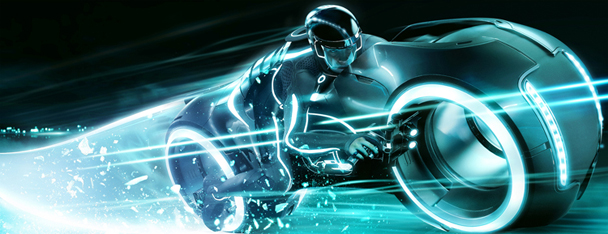TRON: Legacy
Perhaps inevitably, something has been lost in modernising Tron’s retro look in the age of 3D, but there is plenty to gaze at.
Plot summary
Sam Flynn, a rebellious 27-year-old, is haunted by the mysterious disappearance of his father Kevin Flynn, a man once known as the world’s leading video-game developer. When Sam investigates a strange signal sent from the old Flynn’s Arcade, he finds himself pulled into a digital world where Kevin has been trapped for 20 years.

From music videos to video games, and, of course, some of the biggest Sci-Fi films of the last 25 years – 1982’s graphically-mesmerising Tron has had a huge influence on popular culture. This even extends to pop music – so considering the duo’s sound and aesthetic, it won’t have surprised many to learn that Daft Punk were so keen to record the soundtrack to this new ‘sequel’ of sorts.
Yet, Tron: Legacy is arguably the opposite of its highly influential predecessor. Its script is more akin to a bulging sponge that has soaked up the plotlines from various other famous sci-fi films, many of which the original 1982 Tron influenced – The Matrix and The Fifth Element being the most obvious examples. There is even a dramatic scene in which Jeff Bridges removes his helmet and says to what looks like his son: “no, I am not your father.” It sounds like an intentionally funny, self-aware parody, but it instead comes across so unintentionally-blatant that it’s simply confusing.
The ever-watchable Bridges once again reprises his role as Kevin Flynn, a computer programmer who has created a whole new cyberspace universe separate from the real world. Unfortunately for Flynn, his intended paradise also includes his doppelganger nemeses, CLU 2 (also played by Bridges). When Kevin Flynn’s son Sam (Gerrett Hedlund) ends up in this cyberspace world by accident, Sam resolves to save his father and a female cyber-being called Quorra (Olivia Wilde).
The most interesting (albeit brief) performance, though, is supplied by Michael Sheen – who plays a cyberspace bar-owner named Zeus. Quite why Zeus exists is a mystery, as the character seems almost entirely divorced from the plot. With bright-blonde, slicked-back hair and made-up blue eyes, Sheen is aesthetically a bigger David Bowie rip-off than Lady Gaga. Sheen’s acting, however – while clearly nodding towards Bowie – lacks the kind of charisma he’s displayed in the past. Having effortlessly captured Blair, Clough and Frost, you expect Sheen to make a bigger effort with Bowie – especially when he cracks out the air guitar and knowingly utters the lines “I’ve reinvented myself a few times, yes – all in the name of self-preservation of course!” What all this basically seems to amount to is a surreal interlude in which Tony Blair, dressed as Ziggy Stardust, orders Daft Punk (who are over in the DJ booth) to play a suitable soundtrack for the ensuing bar-room brawl.
Even if there are plenty of de ja vu moments, though, Tron: Legacy is at least less of a messy affair plot-wise than its 1982 parent-film. Still, Tron’s cult status largely stemmed from its groundbreaking fusion of live action shots and computer animation rather than its script; and while Tron: Legacy’s visuals are unlikely to reach the same levels of influence and notoriety, they are still the far and away film’s biggest asset. Perhaps inevitably, something has been lost in modernising Tron’s retro look in the age of 3D, but there is plenty to gaze at. There is, for instance, a particularly stunning moment when CLU 2’s eye-popping cyber-army are shown pounding their red, neon arms at the sky.
So yes, Tron: Legacy is all about the visuals. It may look very impressive at times, but the film has precious little else going for it – even the much anticipated soundtrack is fairly mediocre. Given the huge success of Avatar, this isn’t necessarily a problem – but if for some reason the local cinema cannot offer you the full 3D experience, you’ll be better off skipping round the corner to spend your pennies in the video games arcade instead.











COMMENTS